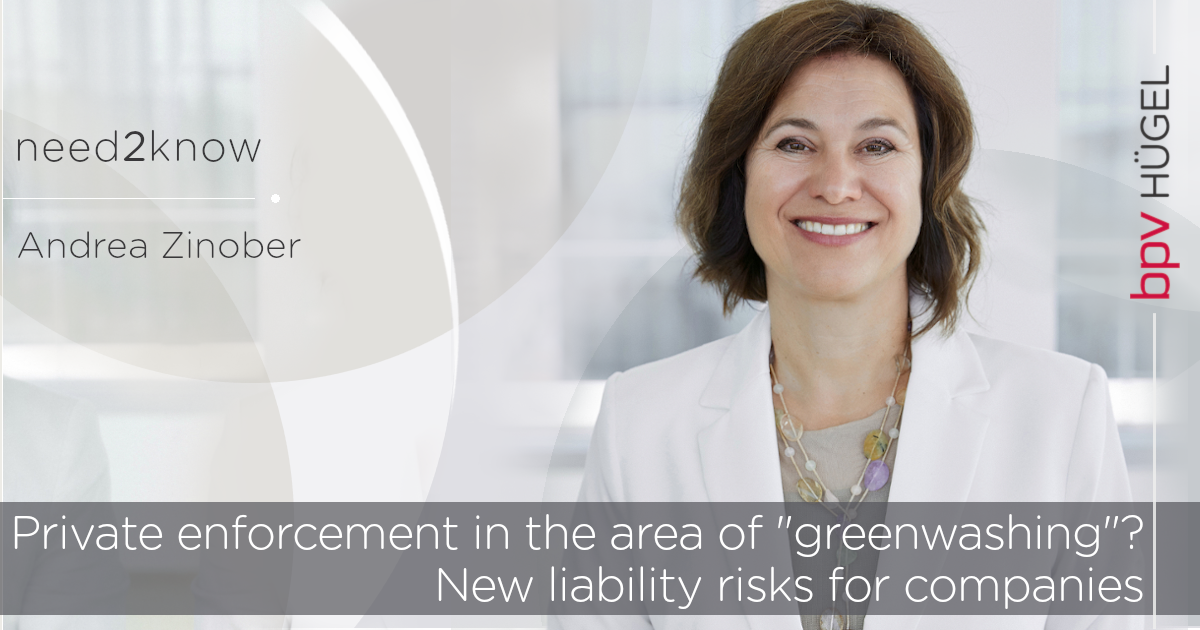29 March 2023 – need2know
Environmental protection and sustainability are the issues of our time. Consumers and companies find themselves in an area of conflict: consumption, prosperity and profit on the one hand, future, health and environment on the other.
It is understandable that advertising and product marketing also consciously focus on environmental issues and sustainable business. Various eco-labels and advertising claims such as “environmentally friendly”, “climate neutral”, “biodegradable” or “bio-based”, “CO2-friendly”, “CO2-neutral”, “nature-friendly” and the like are booming.
But what do they really mean? What impression do consumers get when they hear and see such advertising messages? This is not always easy to determine, but it decides whether they are permissible or cause misleading effects relevant under competition law. According to a study carried out by the Commission in 2020, 53.3% of the environmental claims examined in the EU were judged to be vague, misleading or unsubstantiated and 40% were unsubstantiated. The Commission has therefore presented a proposal for a directive against “green claims”.
“Greenwashing” could already be punished as unfair competition. Since the beginning, a strict standard has been applied here, similar to that in the area of health advertising. According to the case law, it depends on how an ecologically aware, socially sensitive average consumer understands the advertising statement. Up to now, environmental claims could only be used in advertising if they were clearly substantiated and misleading the consumers being advertised to was impossible. Ambiguous statements such as “organic”, e.g. for “organic bricks”, are to be interpreted in the most unfavourable sense for the person using them. Claims such as “first climate-neutral stamp” may also require additional information, for example, if they in fact only refer to a part of the product.
Within the framework of the “Green Claims” Directive, concrete “per se prohibitions” are now to be added. The advertising claims covered by this are in any case inadmissible; an examination of how the consumer understands them is no longer necessary. Such a per se prohibition should in future also cover environmental claims relating to the entire product. These are increasingly the case, among others also in relation to packaging. If, for example, only the bottle of a cleaning product is made of recycled plastic and not also the spray head, a clarifying statement is also required about this. In this case, the blanket statement “packaging made of recycled plastic” would already fall under such a new per se ban in the future.
It should be noted that the new regulations are also intended to conserve resources. We are all familiar with statements such as “printer cartridge empty” and probably also with the fact that many printed pages of paper come out of the printer before it is actually empty. The environmental aspect of so-called “premature obsolescence” is clear: a premature replacement that would not yet be necessary leads to increased consumption, which generates more revenue for the manufacturer but wastes resources. According to the intentions of the European Commission and, as a result, of the national legislator, this too could soon be inadmissible “per se”.
It is also planned to curb the proliferation of sustainability labels and to qualify them as “unfair” in the sense of the UWG if they are not either based on a pre-approved certification system or have been set by a state body. Excepted from this are the already existing EU eco-labels or the EU organic logo.
All these changes lead to a considerable expansion of the liability risk for companies that use “green” and sustainable advertising messages. A core element of the planned reorganisation is an extended consumer compensation law: irrespective of the fact that competitors can already take legal action against “greenwashing” as unfair business practices and assert claims for injunctive relief, damages and, if applicable, lost profits, the consumer compensation law was also recently extended. Businesses are now explicitly obliged to compensate consumers for the damage they have suffered as a result of a business decision they have taken on the basis of a misleading, aggressive or other explicitly enumerated unfair business practice. As in general tort law, there must be actual damage, which the consumer must prove, and an unlawful act. This is present in the case of a misleading or otherwise unfair business practice, such as in the case of “greenwashing”, but must have been causal for this damage.
If one considers that even in the so-called “emission claims”, i.e. lawsuits by consumers who demand compensation for damages due to allegedly increased CO2 emissions of their vehicles, misleading competitive actions are also used as a basis, one must assume that these cases will in any case gain in importance in the future. The new regulations introduce extended private enforcement for “greenwashing”. A critical examination is therefore advisable when planning an advertising strategy and, in case of doubt, should also include an external assessment before environmental claims are used.
Author:
Andrea Zinober
If you have any questions, please contact:
Andrea Zinober (andrea.zinober@bpv-huegel.com)
Practice group:
Unfair Competition, Litigation
If you would like to receive future articles, follow us on LinkedIn or send an email to subscribe@bpv-huegel.com.
Note: This article is intended as general information and provides a brief overview of a complex topic. For this reason, this article is not exhaustive and is no replacement for individual legal advice. If you have any questions, do not hesitate to contact us. We look forward helping you.

